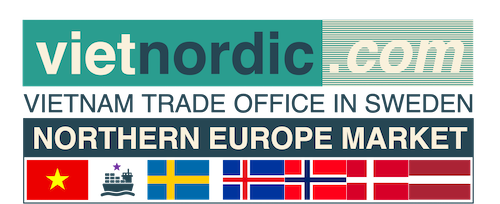Richard Mellgren, Senior Business Development Manager, Sales & Marketing, Port of Gothenburg
It is known that the Port of Gothenburg is an important transshipment port of goods in the Nordic region. What do you think about the potential of Vietnamese goods in the Nordic market in particular and Europe in general?
Looking back at the last five years (2018-2022) we have seen double digit growth between Vietnam and Sweden both in terms export and import, which proves that there certainly is a high interest and demand in further developing the commerce between Viet Nam and Sweden. During the Covid period, Viet Nam continued to evolve as a strong contender in the “China + 1” trend. Vietnamese goods have been in the Swedish market for quite some time and again, the trade continues to grow which confirms there’s good potential for Vietnamese products in the Swedish/Nordic market to continue to thrive. As we also have the Trade Agreement between Viet Nam and EU in place since 2020, this for sure is an enabler for trade growth which we can only urge everyone to use. The Port of Gothenburg is well equipped to handle increased volumes both in terms of containerized cargo but also RO/RO (Roll On/Roll Off) such as the automotive/vehicle industry. All major container carriers are calling our port which is of great importance to ensure cargo between Viet Nam and Sweden can pass through the gateway in Gothenburg as smoothly and efficiently as possible.
The Port of Gothenburg will participate in the Vietnam International Sourcing 2023 to be held in Vietnam in September. What are your expectations when participating in this event?
We are extremely excited to visit the Vietnam International Sourcing 2023 event and we look very much forward to networking with local and international companies in hopes to find mutual areas of interest which can benefit the trade between our countries. We also expect to meet Vietnamese companies who may turn to us for advice when it comes to transporting their cargo to/from Sweden. The port of Gothenburg is the largest port in Sweden and we have an extensive rail road network linking Gothenburg with a number of inland terminals from the south to the north of Sweden (and also Oslo, Norway).
What are the focuses that you would like to discuss to strengthen cooperation with the Vietnamese side in the near future, through Vietnam International Sourcing 2023?
We are focusing on learning more about the Vietnamese market and to better understand how we can contribute in the supply chain in regards to supporting companies with climate smart and sustainable logistical solutions and services. By having a more clear picture of the industry needs and requirements, we can sharpen our competitive edge. It will also be beneficial to understand any trade challenges and to discuss if the Trade Agreement between Viet Nam and Sweden is being used to the extent possible and if not, why, how can we try to improve awareness and usage of same via our discussions when we meet and talk to companies in Sweden dealing and/or planning to establish business with Vietnamese companies. Our desire is also to ensure that after the meetings, people with whom we have met, will consider us thanks to the wide range of services that we can offer coupled with our ambitious sustainability goals. Would be great if can share best practices.
With many years of experience in the field of freight, what advice do you have for Vietnamese businesses to penetrate deeper into the European market in general and Northern Europe in particular?
Apart from long term relationships, making sure to deliver good/high quality products, having skilled work force for the product in question, ESG (Environmental, Social and Governance) is becoming more and more important. The Nordic countries (Denmark, Finland, Iceland, Norway and Sweden) have come quite far in terms of sustainability, not because end consumers are more conscious but they’re also demanding same when selecting products. It will also become mandatory for larger companies as well a number SME’s to follow up on their scope 1 and 2 emissions (in certain cases also scope 3) as part of the Corporate Sustainability Reporting Directive (CSRD) which comes into effect in the EU in January 2024. And of course, keeping pushing the opportunity to make use of the Trade Agreement.

